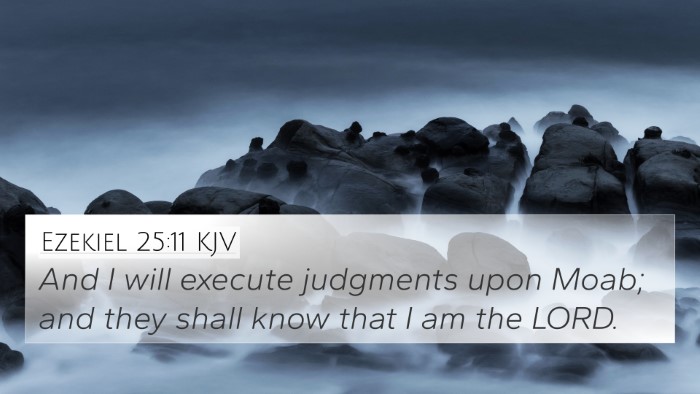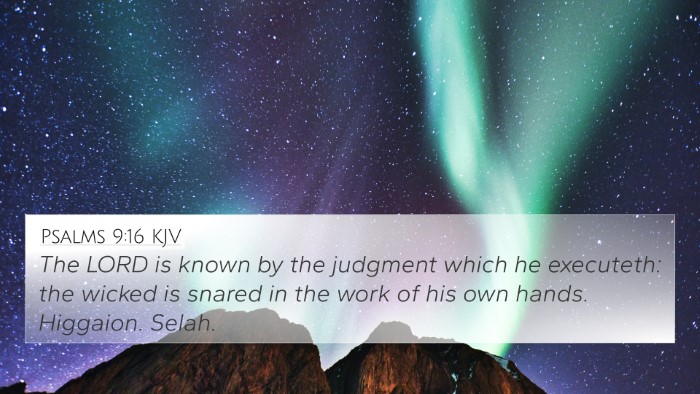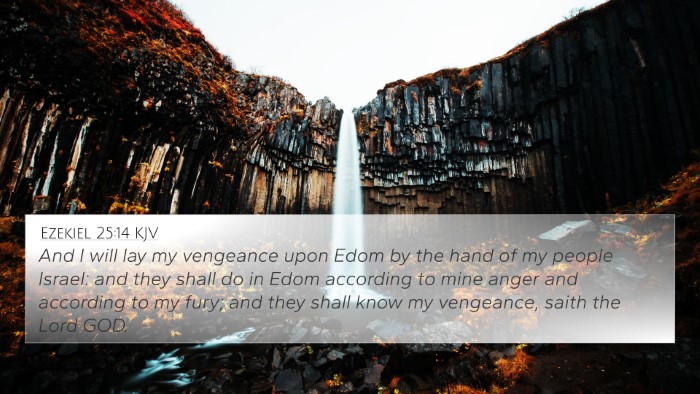Ezekiel 25:17 - Summary and Meaning
Ezekiel 25:17 reads:
"And I will execute great vengeance upon them with furious rebukes; and they shall know that I am the LORD, when I shall lay my vengeance upon them."
This verse reflects the profound themes of divine justice and retribution found throughout the Bible. Various commentaries shed light on its significance, exploring the context and implications of God's actions as portrayed by the prophet Ezekiel.
Context and Background
The book of Ezekiel is predominantly focused on God's judgment against Israel and surrounding nations during a time of exile. In this specific chapter, the Lord expresses His intentions toward the enemies of Israel, emphasizing that their wrongdoing will not go unpunished.
Interpretations from Public Domain Commentaries
Matthew Henry's Commentary
Matthew Henry highlights that this verse showcases God's powerful motives behind His acts of vengeance. He suggests that God's anger is both just and necessary. According to Henry, the message serves to remind the people of Israel and their enemies of God's sovereignty and the certainty of His judgment.
- God’s Vengeance: Henry notes that this vengeance is not frivolous but is a culmination of every wrong done against Israel.
Albert Barnes' Commentary
Albert Barnes focuses on the phrase “they shall know that I am the LORD.” He explains that God's actions serve to demonstrate His presence and authority among His people and adversaries alike. Barnes stresses the importance of acknowledging God's sovereignty, especially in times of distress and conflict.
- Affirmation of Faith: The realization that God is the LORD leads to a deeper understanding of His power and mercy.
Adam Clarke's Commentary
Adam Clarke discusses the impact of this verse on understanding God’s character. He interprets the “furious rebukes” as a clear signal of God's displeasure toward injustice and oppression. Clarke emphasizes that the prophecy presents a holistic view of God as both judge and redeemer, reinforcing the duality of God’s nature in dealing with humanity.
- Judicial Nature: Clarke remarks on how this reflects the judicial aspect of God’s relationship with nations, particularly those that have acted violently against Israel.
Thematic Bible Verse Connections
In exploring Ezekiel 25:17, several cross-references enhance understanding of its implications:
- Deuteronomy 32:35: "To me belongs vengeance and recompense." This verse highlights the theme of God's judgment.
- Romans 12:19: "Vengeance is mine; I will repay, says the Lord." A New Testament affirmation of God's authority to enact justice.
- Isaiah 61:2: "To proclaim the year of the Lord's favor and the day of vengeance of our God." This illustrates God’s dual role in salvation and judgment.
- Nahum 1:2: "The Lord is a jealous and avenging God." Points to God's zeal for justice.
- Malachi 4:1: "For behold, the day is coming, burning like an oven." A prophesy about the day of the Lord and His judgment.
- Matthew 24:30: "And then will appear in heaven the sign of the Son of Man..." This emphasizes the ultimate revelation of God’s power during final judgment.
- 2 Thessalonians 1:6: "Since indeed God considers it just to repay with affliction those who afflict you." This reinforces the biblical principle of divine retribution.
- Hebrews 10:30: "For we know him who said, 'Vengeance is mine; I will repay.'" It echoes the theme of divine justice established in the Old Testament.
- Revelation 6:10: "O Sovereign Lord, holy and true, how long before you will judge and avenge our blood?" A cry for justice from the martyrs.
- Psalm 94:1: "O Lord, God of vengeance, O God of vengeance, shine forth!" Invokes God’s power and righteousness in adversity.
Understanding Cross-Referencing in Biblical Texts
Cross-referencing Biblical texts is an invaluable tool for Bible study, allowing believers to uncover deeper meanings and connections between verses. Here are some insights into using this approach effectively:
- How to Find Cross-References in the Bible: Utilize a Bible concordance or a cross-reference Bible study guide.
- Identifying Connections: Look for intersecting themes like justice, mercy, and vengeance that resonate throughout scripture.
- Comparative Study: Analyze how different authors in the Bible express similar themes, especially when cross-referencing Old and New Testament writings.
Conclusion
Ezekiel 25:17 powerfully encapsulates themes of divine retribution, the sovereignty of God, and the certainty of judgment. As illustrated by various commentaries, understanding this verse in conjunction with other scriptural references provides a comprehensive insight into the nature of God's justice and His unwavering commitment to His people. Exploratory studies involving cross-referencing between passages yield enriched meanings and offer believers invaluable perspectives for spiritual growth.








